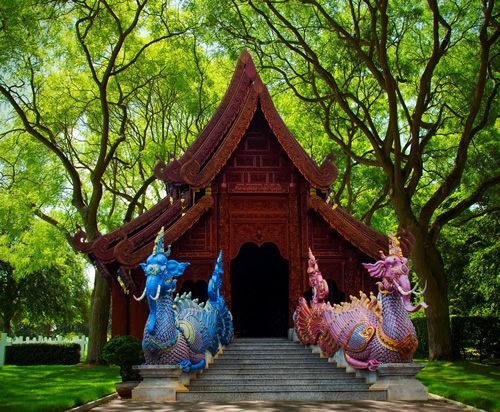10 Days of Silence at a Buddhist Retreat in Thailand
By Thomas Handy Loon

|
|
A temple that sits in a forest in Thailand.
|
Practice meditation like you go to the toilet, just... let go!” The Buddhist monk was serious; the apprentice meditators howled with laughter. Later, with the same sincerity, he said, “Only loving kindness can overcome defilement.”
I hadn’t come to Thailand to meditate. But with so many spiritually thirsty eyes turned east these days I was curious. Suan Mokkh (Garden of Liberation) offers economical enlightenment. Ajahn Po, its senior monk, leads silent 10-day retreats, in English, in the tradition of anapanasati (mindfulness with breathing), said to have been the Buddha’s favorite method of teaching.
“Don’t just do something, sit there!” we were told. Buddhism in a nutshell. Not being the silent type, 10 chatter-free days was a daunting prospect. Reading, writing, smoking, sex, caffeine, music, and alcohol are also forbidden. Everyone agreed — in writing — to these rules. Life is suffering is Buddhism’s first noble truth. My studies had begun.
Retreatees, segregated by sex, were assigned individual rooms throughout the spacious, tranquil grounds; but the supplied straw mat didn’t cushion my bones against the concrete bed. Communal toilets and open-air bathing cisterns lined the courtyard. Lights out was at 9:30 p.m. daily.
All essentials, including vegetarian meals, were provided. A giant, gentle bell beckoned at 4 a.m. daily; two teachings and 90 minutes of yoga preceded the 8:30 morning meal. Meditation-oriented lessons continued, with breaks, until 9 p.m.
The silence was frustrating. To clear my mind and meditate, I thought, I must feign indifference to the world’s very real problems and to other retreatees and outwit my own mind’s clutter.
“The world offers much, but never keeps its promises. There’s never an end to ‘more’; selfish desire is endless,” said Ajahn Po.
But wasn’t this very discussion itself selfish, this immersion in self-discovery? And why couldn’t I meditate?
“It doesn’t matter if you meditate or not, just be peaceful. To sit quietly with your thoughts is enough,” said Nun Pirot, a diminutive Thai with a Berkeley PhD who’d become a nun after 20 years as a genetic engineer.
Buddhists claim some beginners need months to get beyond the “monkey mind’s” distractions; you have got to want to let go. I was used to indulging distractions and shallow pleasures.
By the sixth day 42 of the 130 retreatees had left. Apparently, such attrition is normal. I felt strangely relieved. Though I had shed private tears of loneliness and frustration, I had not thought of leaving.
“Meditation is boring!” I wrote — breaking the rules — in my journal: “I’m a hopeless product of our culture of rampant distraction. Anyway, has this old monk ever known the serenity of a folk festival, the magic of a lover’s touch, the dissolution of a drunken stupor? Granted, he knows Buddha’s happiness. But how can he pass judgment on mine?”
In a permitted interview, I asked Ajahn Po if he’d ever indulged worldly desires. He was elusive. “I entered the monastery at 20,” he said, and spoke of his early studies. “Fifty years ago, young people didn’t do the things they do today. I was a normal boy, with normal friends.” I gave up. “Praise the one who truly lives, even for a single night,” goes the Buddhist chant.
As the end approached, I still could not meditate. I was lonely. The deafening silence was tearing at my emotional continuity.
On the final afternoon, Ajahn Po was smiling. “You are now good friends, you can help each other,” he said. “This retreat is like swimming a river. But there are many rivers.”
Nearly half of the attendees had left. Those remaining were allowed to meet and talk. Some, like me, had not achieved much. An engaging Israeli talked about the arguments among his many “brains,” each with its own monkey mind, while wandering the multi-textured dimensions of meditationland. We all agreed the retreat had been valuable, but nobody could go farther than that.
That evening, acting on a suggestion, I pushed an imaginary cardboard box (representing enlightenment) into my emptied mind space. When I visualized opening it, light blazed out. I embraced the beacon and felt my unconscious, subconscious, and conscious shimmer as one. Finally, on the last day, I had meditated! I was not hopeless! I felt fulfilled. But the retreat was over.
In a final session everyone was upbeat, except about leaving this oasis of surreal simplicity. The following morning both sexes intermingled and compared notes. Then shuttles whisked us away to nearby train and bus stations and our continuing journeys. A few newly formed alliances were in evidence.
I have stayed in touch with four retreatees and exchanged insights, but mostly we have socialized. I presently benefit from occasional meditation and from the knowledge that Buddhists everywhere have consciously chosen this peaceful alternative to the frenzy of modern, Western life. Ten days of silence was not enough to change my life fundamentally, but I did glimpse enlightenment. Somewhere to the east.
For More Info
Suan Mokkh, near Surat Thani in central Thailand, is 10 hours by train or bus or an hour by air south of Bangkok. From Surat Thani, head northwest. Finding the right bus and the right stop is easy; everyone knows it.
Suan Mokkh does not accept reservations, lists no phone number, and probably will not respond to written inquiries. Suan Mokkh International Dharma Hermitage does offer a website with more details. Retreats begin on the first day of every month, as they have for many years. Just show up and leave the outside world behind.
THOMAS HANDY LOON teaches at Leech lake Tribal College, Cass Lake, MN.
|
